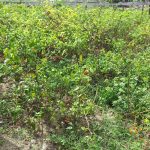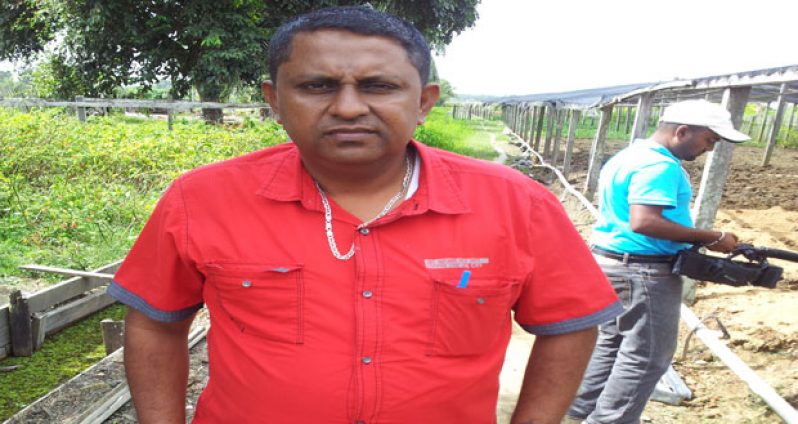Walk through any of the market in Georgetown or our rural communities, and see the abundance and easily affordability of food, of fresh, healthy fruits and vegetables. Our markets decorate our landscape as a rich colorful symbol of the Guyanese nation feeding themselves with healthy ease.Zamal Hussein toils behind the scenes of those market scenes to supply wholesome fruits and vegetables to our vibrant market vendors.
The Guyanese market scene springs alive every day, full of pulsing humanity, the open air and sunny displays now embedded in our cultural soul.

Walking through Bourda Market, Stabroek Market, or picking through ground displays at Parika, Port Mourant, Lusignan, Bartica becomes an adventurous experience. People laugh loud and tout their greens and deals and huckster their provisions, with that strong Guyaneseness of spirit.
Hussein knows the scene all too well. Seven years ago, he chose to convert the 15-acre land he owns at Vryheid Village aback of New Amsterdam in Berbice, into a thriving new kind of small-scale farming: he operates what he calls “shade-gardening”, supplying 400 pounds of celery a week to market vendors who show up at his gate three times a week in canter trucks to source the produce, transport it to markets, and sell to Guyanese.
The Guyana Chronicle toured Hussein’s shade-garden this week, enjoying his hospitality, filled with glasses of fresh-picked coconut water and jelly, a bucket-full of sweet ripe guava, and a long chat in his breezy hammock overlooking rows and rows of fresh-cultivated garden beds.
Hussein lives the Guyana Dream. He dreams of what’s possible for us as a people. He plows and cultivates his land, converting swamp areas into high ground. He feeds the nation, joining thousands and thousands of hardworking gardeners and farmers and cash-crop cultivators and small-scale planters who turn our fertile paradise of a landscape into a providential blessing, feeding us wholesome, healthy, fresh, organic fruits and vegetables.
Hussein made the telling point that, were Guyanese to concentrate on a diet of fruits and vegetables, shunning imported processed food and grocery-store–carrying expensive manufactured food, we would be a healthy nation, able to feed ourselves well.
Indeed, Guyana today has achieved full food security, with an abundance of locally-produced fruits and vegetables. We grow our own, and supply the nation across the length and breadth of this country with fresh, organic food.
Hussein sells celery for a mere $80 a pound, so cheap and affordable is local-grown food in our markets.
The days of Guyanese starving, or suffering malnutrition and shortage of availability of food are long gone. Now we take for granted the easy and affordable availability of fruits and vegetables.
Yet, despite fresh fruits and vegetables being so affordable in the markets, with $1,000 easily feeding a small family enough fresh, wholesome vegetable for a week, entrepreneurs like Hussein still make a decent profit. “My shade-garden is a very profitable business,” he told the Chronicle.
The man lives an amazing lifestyle on his land. The land stretches from the residential street at Vryheid way down to the horizon, bordering on the western shore of Canje Creek. He plants a mere two acres, with an eye to expansion. In the back section, he’s got people planting rice.
He believes Guyanese could achieve anything they want today, with hard work, discipline and patience. “People who don’t develop their personal lives in Guyana today may be too lazy. There’s a direct relationship between remaining in poverty, and laziness. Our country offers anybody this opportunity, but it calls for hard work,” he said.
Hussein, 43, is an expert at lumber, having worked in the timber industry since 1970. In fact, he operates a lumber sale business in New Amsterdam, and owns a timber grant aback the Canje Creek area.
Jovial, pleasant and easy-going, he works his two businesses, the lumber-sales operation and the shade-garden, both small-scale operations, providing a living for 25 Berbicians.
“Today, farming is a respectable profession. It used to carry a stigma to it, of poor people working the land because they had no skill. But today, I could walk through my shade-garden with my polished shoes on and not pick up any mud. Farming is not what it used to be. Now it’s profitable, professional and very knowledge-intensive’” he said.
He talks with easy expertise about farming techniques, noting that special netting provides ideal shade for delicate plants like celery. He researched and learned how to minimize the impact of the harsh midday sun and heavy rains on his plants, using the netting to let in just the right amount of sunlight and rain.
PVC pipes decorate the garden beds, as he designed a sprinkler system to water the plants. He connects a small electrical pump to the pipe-sprinkling system, and his worker stands back and watches as the plants become watered and freshened.
With a wealth of information on the Guyana timber industry and small-scale cash crop gardening, Hussein employs his knowledge to full effect, living the full potential of the Guyanese Dream.
His young son just graduated from the University of Guyana in Computer Science, already driving his own car and looking to contribute his skills and expertise to the development of Guyana.
The family’s success story pictures a Guyana developed and thriving, and Hussein showered lavish praise on Government for creating the atmosphere in Guyana today that allows him to self-develop and live his dream. He vacations in the US and Canada, and not even once thinks of migrating.
“Government did an admirable job to repair broken drainage and irrigations systems, and build roads and our school building and encouraging us in this community to till our land,” Hussein said.
He said Government works hard to make sure the nation develops, with deep sustainability for the land, nature, and the natural environment, noting that every single tree that the timber industry cuts down, across the length and breadth of Guyana, must be tagged and recorded within an international system managed at the Guyana Forestry Commission.
Hussein said the Commission provides lugging operators with free tags. Infrared GPS technology secure the tags as an international recording system that monitors Guyana’s forestry use, in line with a Government deal with Norway to preserve the forests, and with former President Bharat Jagdeo’s vision of securing international financial compensation for Guyana’s carbon preservation.
He lauds Guyana’s development today, noting that cost-of-living is super low, once people choose to eat healthy, wholesome locally-grown fruits and vegetables.
He said before 1992, the Vryheid community lacked proper drainage and irrigation, and residents did no real farming, and no one planted rice.
Now, the entire community thrives, with new roads, electric lights and working irrigation systems.
“Since 2000, I’ve been operating my own business, and I am seeing progress and development in my own life, and in Guyanese being able to feed, house and clothe themselves, and in Berbice moving to a higher standard of living,” Hussein said.
by Shaun Michael Samaroo



.jpg)











